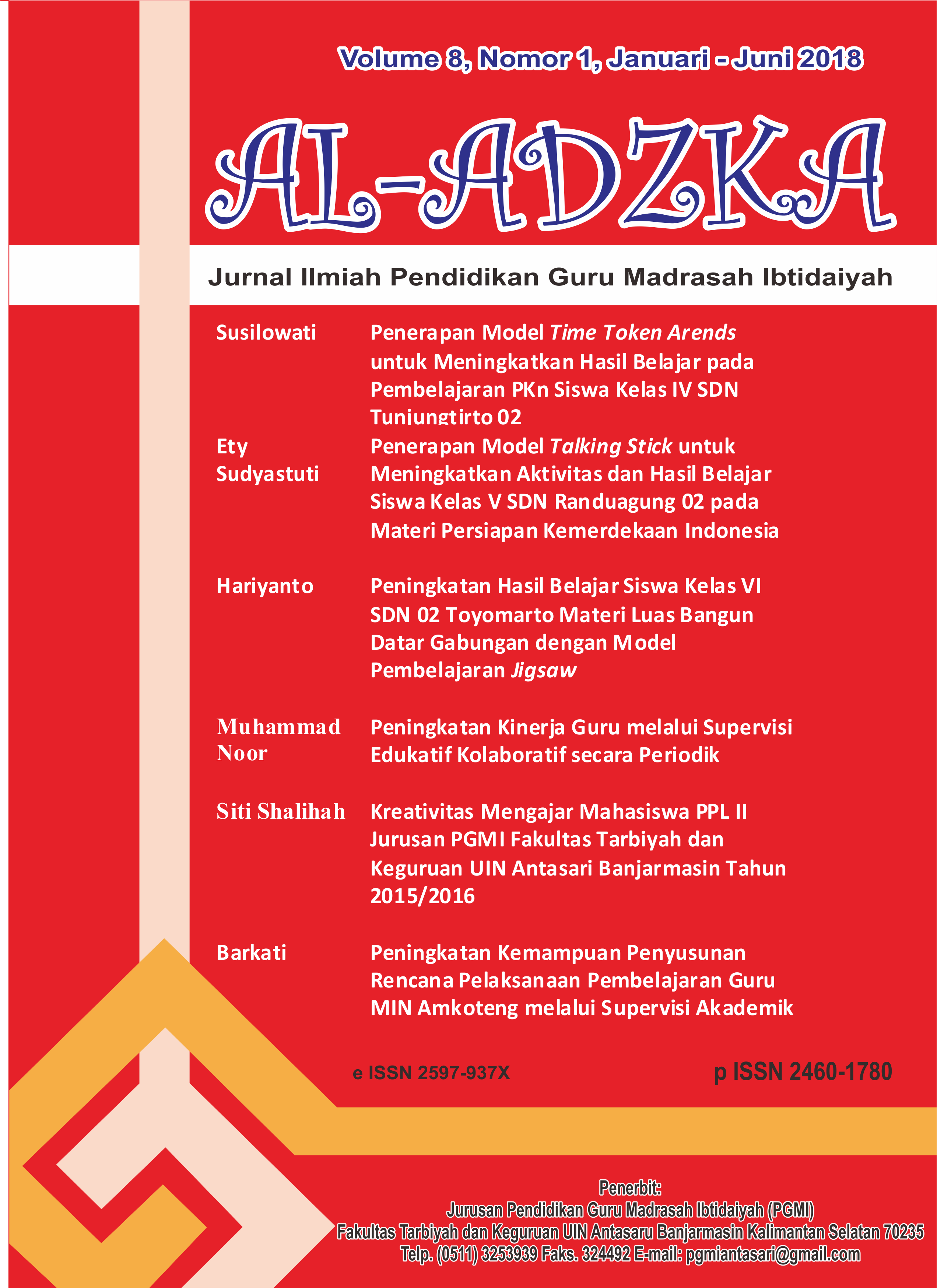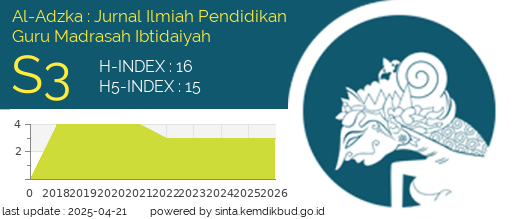Penerapan Model Time Token Arends untuk Meningkatkan Hasil Belajar pada Pembelajaran PKn Siswa Kelas IV SDN Tunjungtirto 02
DOI:
https://doi.org/10.18592/aladzkapgmi.v8i1.2170Keywords:
time token arends model, activity, learning outcomes, PKnAbstract
The purpose of this research is to describe the application of Cooperative Time Token Arends learning model to increase learning outcomes of fourth grade students of SDN Tunjungtirto 02, Singosari. This research uses Classroom Action Research (PTK) with 2 (two) cycles. The subjects of this study were 16 students of grade IV SDN Tunjungtirto 02 Singosari. Data collection techniques in this study are observation, interviews, documentation, and tests. The technique to analyze the data used in this research is descriptive qualitative analysis technique. The results show that learning by applying the Time Token Arends Cooperative model on the subject of globalization can increase learning outcomes. Student learning outcomes also experienced an average increase from cycle I (72.12) to cycle II (76.9). Classical mastery increased by 12.5% from cycle I to cycle II.References
Akbar, Sa’dun. 2009. Penelitian Tindakan Kelas Filosofi, Metodologi & Implementasinya. Yogyakarta: Cipta Media Aksara.
Arends, Ricard I. 2008. Learning to Teach (edisi ke-7). Yogyakarta: Pustaka Pelajar.
Arikunto, Suharsimi. 2009. Dasar-Dasar Evaluasi Pendidikan. Jakarta: Bumi Aksara.
Depdiknas, 2006. Peraturan Menteri Pendidikan Nasional Republik Indonesia Nomor 22 Tahun 2006 Tentang Standar Isi untuk Satuan Pendidikan Dasar dan Menengah. Jakarta: Departemen Pendidikan Nasional.
Depdiknas. 2007. Model Kurikulim Tingkat Satuan Pendidikan SD/MI (KTSP). Solo: Tiga Serangkai Pustaka Mandiri.
Dimyati dan Mujdiono . 2006. Belajar dan Pembelajaran. Jakarta: PT Rineka Cipta
Fajriah, Lailatul. 2009. Penggunaan Metode Simulasi untuk Meningkatkan Hasil Belajar Siswa Kelas V di SDN Sidorejo 02 Pagelaran-Malang pada Matapelajaran PKn. Skripsi tidak diterbitkan. Malang: FIP Universitas Negeri Malang
Hamalik, Oemar. 2010. Kurikulum dan Pembelajaran. Jakarta: Bumi Aksara
Hanafiah dan Sujana. 2009. Konsep Strategi Pembelajran. Bandung: PT Refika Aditama
Isjoni. 2010. Cooperative Learning Efektivitas Pembelajaran Kelompok. Bandung: CV Alfabeta.
Lie, Anita. 2010. Cooperative Learning Di Kelas Kita. Jakarta: Grassindo.
Ruminiati. 2008. Pengembangan PKn SD. Jakarta: Dikti Depdiknas.
Suharjo. 2006. Mengenal Pendidikan Sekolah Dasar. Jakarta: Direktorat Jendral Pendidikan Tinggi.
Suprijono, Agus. 2010. Cooperative Learning Teori dan Aplikasi PAIKEM. Yogyakarta: Pustaka Pelajar.
Suyatno. 2009. Menjelajah Pembelajaran Inovatif. Sidoarjo: Masmedia Buana Pustaka.
Widodo, Rachmad. 2010. Model Pembelajaran Time Token Arends. Rachmadwidodo’s, (Online), (http://wyw1d.wordpress.com/2009/11/14/model-pembelajaran-time-token-arends1998/), diakses 10 Januari 2011.
Yuanita, Eva. 2010. Model Pembelajaran Time Token Arends. RHUM4H ND3SO Q, (Online), ( http://rhum4hnd3soq.blogspot.com/2010/11/model-pembelajaran-time-token-arends.html), diakses 10 Januari 2011.
Downloads
Published
How to Cite
Issue
Section
License
Authors who publish with this journal agree to the following terms:
- Authors retain copyright and grant the journal right of first publication with the work simultaneously licensed under a Creative Commons Attribution 4.0 International that allows others to share the work with an acknowledgement of the work's authorship and initial publication in this journal.
- Authors are able to enter into separate, additional contractual arrangements for the non-exclusive distribution of the journal's published version of the work (e.g., post it to an institutional repository or publish it in a book), with an acknowledgement of its initial publication in this journal.
- Authors are permitted and encouraged to post their work online (e.g., in institutional repositories or on their website) prior to and during the submission process, as it can lead to productive exchanges, as well as earlier and greater citation of published work.












